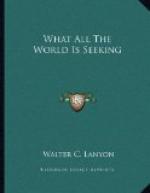This same principle is the solution, and the only true solution, of the charities question, as indeed the whole world during the last few years or so, and during this time only, is beginning to realize. And the splendid and efficient work of the organized charities in all our large cities, as of the Elberfeld system in Germany, is attesting the truth of this. Almost numberless methods have been tried during the past, but all have most successfully failed; and many have greatly increased the wretched condition of matters, and of those it was designed to help. During this length of time only have these all-important questions been dealt with in a true, scientific, Christ-like, common-sense way. It has been found even here that nothing can take the place of the personal and friendly influences of a life built upon this principle of service.
The question of aiding the poor and needy has passed through three distinct phases of development in the world’s history. In early times it was, “Each one for himself, and the devil take the hindmost.” From the time of the Christ, and up to the last few years it has been, “Help others.” Now it is, “Help others to help themselves.” The wealthy society lady going down Fifth Avenue in New York, or Michigan Avenue in Chicago, or Charles Street in Baltimore, or Commonwealth Avenue in Boston, who flings a coin to one asking alms, is not the one who is doing a true act of charity; but, on the other hand, she may be doing the one she thus gives to and to society in general much more harm than good, as is many times the case. It is but a cheap, a very cheap way of buying ease for her sympathetic nature or her sense of duty. Never let the word “charity,” which always includes the elements of interested service, true helpfulness, kindliness, and love, be debased by making it a synonym of mere giving, which may mean the flinging of a quarter in scorn or for show.
Recognizing the great truth that the best and only way to help another is to help him to help himself, and that the neglected classes need not so much alms as friends, the Organized Charities with their several branches in different parts of the city have their staffs of “friendly visitors,” almost all voluntary, and from some of the best homes in the land. Then when a case of need comes to the notice of the society, one of these goes to the person or family as a friend to investigate, to find what circumstances have brought about these conditions, and, if found worthy of aid, present needs are supplied, an effort is made to secure work, and every effort is made to put them on their feet again, that self-respect may be regained, that hope may enter in; for there is scarcely anything that tends to make one lose his self-respect so quickly and so completely as to be compelled, or of his own accord, to ask for alms.




